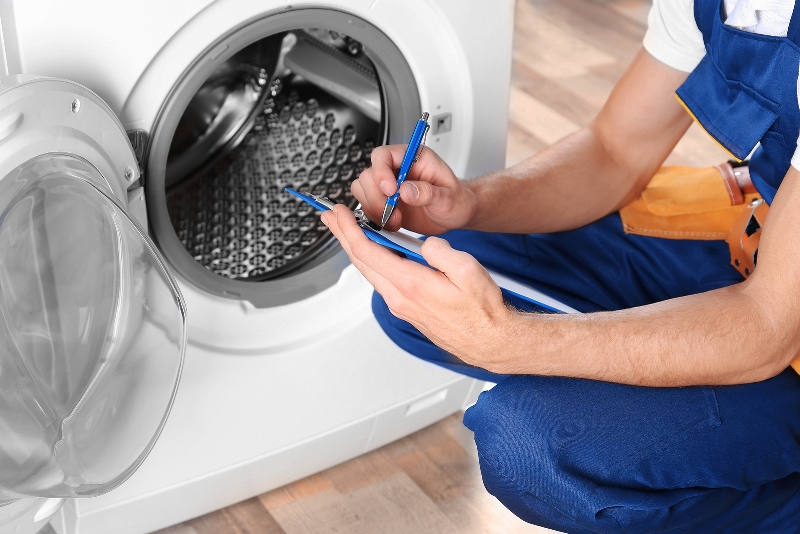Undoubtedly, having a home appliance can be relieving. It becomes easy to undertake any chore in minutes, including cooking, washing, and dry cleaning. Without these gadgets, getting through the day may be challenging for anyone with tons of tasks. In its early stage, an appliance performs optimally. However, its performance tends to decline due to factors like wear and tear. For this reason, there is a need for such machines to undergo repair. But not all appliances require fixing; some require overhauling.
It is essential to hire the services of an appliance repair professional. This individual will determine if the gadget is due for repairs. In some cases, a washing machine may require the replacement of some of its broken or faulty parts. Most home appliances run on electricity. What this means is that they use AC (Alternating Current). Small gadgets come with two-pin cords and perform using 110-120 volt. Big appliances require more power to operate (220-240 volt). They have three-pin connectors, which feature a grounding wired connection.
When to Repair Faulty Appliances Personally
Not all appliances require the services of a certified repair professional. However, a homeowner should have a basic understanding of simple electrical works, including wiring. Once this is in place, it becomes easy for such an individual to fix simple faults; otherwise, undertaking such tasks may be hazardous and expensive. Here are some tips to take home when dealing with faulty or broken appliances.
- Repairs are easy to conduct on components coupled together with fasteners, like bolts, screws, and plugs. On the other hand, welded or riveted parts require the expertise of an appliance repair expert from Asurion Appliance Repair. Avoid fixing faulty components of this type personally.
- Before pulling the faulty component apart, disconnect it from the main source of power (electricity/gas). Failure to do so may result in fire or electrical hazards. Additionally, don’t come in direct contact with specific open parts of the appliance when testing it with the power supply. Make adjustments where necessary.
- It is easier and safer to replace faulty components in an appliance than to fix them. As such, hiring a professional is a call in the right direction. This individual will have a comprehensive idea of where to get available replacement parts and their relative costs.
Considering the LifeSpan of An Appliance

Every appliance has its average life span, which helps in determining when it is due for a replacement. Here are some of them:
- Freezer: 11 years
- Refrigerators (compact): 9 years
- Refrigerators: 13 years
- Dishwasher: 9 years
- Dehumidifiers: 8 years
- Garbage disposers: 12 years
- Air conditioners (central): 15 years
- Air conditioners (room): 10 years
- Furnaces (oil warm air): 20 years
- Furnaces (gas warm air): 18 years
- Furnaces (electric warm air): 15 years
- Dryers (electric and gas): 13 years
- Boilers (gas): 21 years
- Boilers (electric): 13 years
- Microwave ovens: 9 years
- Compactors: 6 years
- Ranges (gas): 15 years
- Ranges (electric): 13 years
- Range/Oven hoods: 14 years
- Thermostats: 35 years
- Water heaters (tankless): 20 years plus
- Water heater (gas): 10 years
- Water heaters (electric): 11 years
- Washing machines: 10 years
Above is a list containing some appliances and their average life spans. However, it is worth noting that the latter depends on the amount of usage and the degree of maintenance. For example, two LG refrigerators of the same model may not have the same life span under the care of two different households. A single resident may maintain one of the machines better than a family of six.
What About Warranties?
The good thing about owning a new appliance is that it comes with a warranty (typically one to three years). This is a form of assurance from the manufacturer that the product will undergo strict and professional maintenance when the need arises. This warranty comes with a timeframe, varying from one company to another, and one appliance to another. It covers replacement parts and also labour cost.
Common Issues Experienced with Specific Appliances

Appliances tend to have individual and general issues, depending on their power source (electricity/gas), brand, model, and type. Here are some gadgets with their potential problems.
Refrigerators
Refrigerators play an essential role in preserving food items, especially perishable goods. However, they may tend to generate issues over time, some of which may include humming or buzzing signs. If the appliance fails to cool items, the compressor may be faulty. Replacing it will be a call in the right direction. Other signs may include the following:
- Weird sound from the evaporator fan.
- Loud sound from the ice maker.
- Rattling sounds from specific parts of the appliance.
- Strange noises resulting from the overheating fan.
- Clicking sound signifying issues with the start relay.
Dryers
A dryer may have problems when the following occurs:
- Lack of heat generation
- Overheating
- Unusual movement within the components
Electric dryers are not as expensive to repair as their gas counterparts. In some cases, repair costs may be up to $150 more for the latter. Parts to fix may include flame sensors, dryer belt, thermal fuses, gas valves, and igniters.
Dishwashers
A dishwasher may be faulty if it fails to drain the water, generate heat to dry the dishes or even features leakage within specific components. Parts to repair may include the pump, valve, motor, and filter. Click here to learn more about the best dishwashers for your kitchen.
Washing Machines
Washing machines tend to develop various problems over time, due to age and constant wear and tear. Some of the potential issues include:
- Wobbling
- Poor drainage
- Leaking
- Water pooling
- Mechanical failures, just to mention a few.
Appliance Repair Cost
Several factors influence appliance repair costs, including age, source of power (gas or electricity), and brand. Generally, the amount spent on repairing an appliance may range from $105 to $250. This cost covers labour as well, which may sit between $50 and $150 per hour. However, it could be, depending on the factors discussed before. Some households pay as high as $450 to fix their gadgets.
For a dryer, oven or range, expect to pay anywhere between $100 and $430. For refrigerator or freezer repairs, costs may range from $100 to $450. Microwaves may be cheaper, depending on the fault and specialist handling it, with a starting cost of $50, which may shoot up to $400. Washing machine repair costs sit between $100 and $350, while dishwashers are anywhere from $160 to $300. Other factors that determine an appliance repair cost, include:
- Availability and accessibility of replacement parts
- Accessibility of the appliance – how easy it is to reach the affected areas
- Professionalism – who is handling the repairs
Bottom Line
The following factors come to mind when hiring an appliance repair professional:
- The feasibility of paying via a credit card
- The availability of references to evaluate the success rate of the repair project
- Possible documented guarantee in case of a post-repair fault, and other available coverages
It is also essential to get a written quote from the repair contractor.






